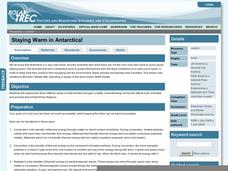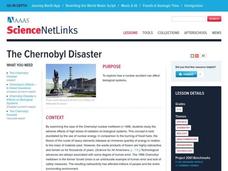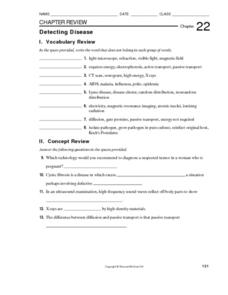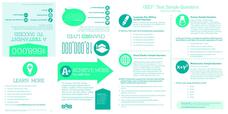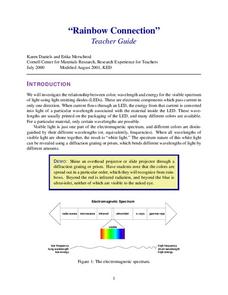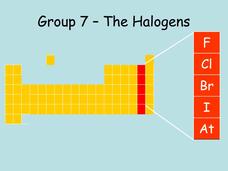Curated OER
Solar Flare Reconstruction
In this solar flare reconstruction worksheet, students read about the 'saturation' point of satellite detectors when solar flares are at their most intense phase of brightness. Students are given x-ray flare data and they re-plot the...
Curated OER
Heat Transfer Team Review Quiz
In this heat transfer worksheet, students answer one true or false question about heat and three multiple choice questions about heat transfer including conduction, convection and radiation.
Curated OER
Radiation Crossword Puzzle
In this radiation learning exercise, students complete a crossword puzzle by figuring out the vocabulary terms associated with the 25 clues given.
Polar Trec
Staying Warm in Antarctica!
Has your class ever wondered how animals and scientists stay warm in the Polar Regions? Kids will investigate to understand the three types of heat transfer and how heat transfer affects those trying to stay toasty in sub-zero...
Curated OER
THE CHERNOBYL DISASTER
Students explore how a nuclear accident can affect biological systems. They examine the case of the Chernobyl nuclear meltdown in 1986.
Curated OER
Chemical Sleuthing
Students engage in a lesson which includes flame tests and the construction of a simple diffraction spectrograph with which to measure sodium ion emissions. They use the Bragg equation to compute the wavelength of the line spectra produced.
NASA
Taking a Cold, Clear Look at the Universe
Take a look with another perspective. Pupils read to find out what portion of the electromagnetic spectrum a space telescope sees and the difficulties of viewing infrared radiation from other objects in space. Individuals discover how...
Curated OER
Teaching Biology Through Problem-based Activities
Students plant seeds and observe the life cycle of the organism. They experimentally research the effects of radiation on seed growth. Students determine the effects of environmental pollutants on harvested seed.
Santa Monica College
Flame Tests of Metal Cations
Scientists used flame tests to identify elements long before the invention of emission spectroscopy. Young chemists observe a flame test of five metal cations in the fourth instructional activity of an 11-part series. Individuals then...
Curated OER
Incoming Solar Radiation
Demonstrate how the spherical shape of the Earth contributes to unequal heating of its surface and results in varying climates at different latitudes. This would be an illuminating addition to your meteorology lessons, especially when...
Curated OER
Detecting Disease
In this detecting disease activity, students will review the different tools scientists use to identify diseases including the steps of Koch's postulates. This activity has 14 fill in the blank and 4 short answer questions.
Curated OER
Check Out Lights and Shields with Beads
Students explore Ultraviolet detecting beads and conduct several investigations with them. In this investigative lesson plan students participate in an experiment to see the harmful effects of UV light and discuss their findings.
Curated OER
Electromagnetic Waves
In this electromagnetic waves worksheet, students review the different types of electromagnetic waves. Students also compare and contrast light and sound waves. This worksheet has 10 fill in the blank, 5 multiple choice, and 6 short...
Curated OER
Worksheet 4-1 Atomic Spectra
In this atomic spectra worksheet, students answer eighteen questions about wavelengths of light, the emission spectrum, energy of photons, the frequency of electromagnetic radiation and electrons in the excited state.
Curated OER
The Bohr-Rutherford Model of the Atom
In this atom model worksheet, students explore how scientists developed the Bohr-Rutherford atom model. Students complete 15 fill in the blank statements.
NASA
The Electromagnetic Spectrum
Did you realize the visible light spectrum is less than three percent of the electromagnetic spectrum? A hands-onlesson includes five activities and experiments for scholars to explore and discover many advanced science concepts. They...
Curated OER
Electromagnetic Energy and Its Spectrum
Your older elementary young scholars investigate electromagnetic energy and the electromagnetic spectrum. They will observe 7 items represented in the electromagnetic spectrum and make a poster of all the things the items have in common....
Glynn County School System
Multi-Wavelength Astronomy
Take a look at astronomy through the light lens. From radio to gamma, light waves exist in every corner of the universe. An enlightening PowerPoint presentation gives an overview of the different categories of light and then discusses...
K5 Learning
Space Based Astronomy
How much astronomy can you study with the naked eye? Learn more about the ways scientists explore the galaxy with a short reading passage and set of short-answer questions.
GED Testing Service
Achieve More: The GED Test
By 2018, 63% of US jobs will require a college degree or professional certificate. This is just one of the many great informational points you'll find on this handout, which you can use to inform your student body with the necessary...
Glynn County School System
Our Sun
The sun is responsible for almost 99 percent of the solar system's mass. As an essential part of our lives, the sun has many important features. A PowerPoint lesson presents information about features such as sunspots, the magnetic...
Cornell University
LEDs Rainbow Connection
View LED lights through the eyes of a scientist. Young scholars learn to view light as a wave frequency and connect various frequencies to different colors on the light spectrum. A lab activity asks groups to measure the frequency of...
Curated OER
Group 7, The Halogens
The ten slides in this presentation make a consice introduction to the halogen group of the periodic table of elements. The location of the group is displayed, and then the characteristics of the different halogen group members are...
Curated OER
Electromagnetic Spectrum Worksheet
These six multiple-choice questions ask pupils to evaluate the energy, wavelength, and frequency of particular electromagnetic wavelengths. Further questions then require them to apply their knowledge and convert certain values or give...





